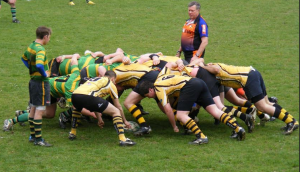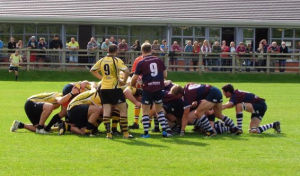I’ll start this piece by dec laring that I have not had any experience of ever having been in a scrum. Something, along with never having eaten a kebab, I intend to maintain for some considerable time if I can.
laring that I have not had any experience of ever having been in a scrum. Something, along with never having eaten a kebab, I intend to maintain for some considerable time if I can.
Last weekend I was up early on Saturday morning so as is my habit if there is a game of rugby to be watched. I switched on the Queensland Reds v Waratahs match on Sky and sat down with a cup of coffee. What I noticed immediately was the first scrum of the game was a mess.
Hookers appealing that there counterpart was “over the mark” or off to the side or whatever. This scrum was attempted to be set two or three times before the referee gave a free-kick for something and off ran the Waratah’s number 8 with the ball. Nothing too serious I guessed. The next scrum occurred and similar antics ensued.
This time the scrum collapsed. A penalty awarded and 3 points were added to the board and so the game continued. As I watched I am pretty sure I counted 15 scrums from which not once did the ball appear in any form other than a free-kick or a penalty. Even the Ozzie commentators were moaning about it.
 Now compare this to later that same day when I went to watch two teams on Eastern Counties One playing on a breezy common on the Suffolk coast.
Now compare this to later that same day when I went to watch two teams on Eastern Counties One playing on a breezy common on the Suffolk coast.
There were lots of opportunities for handling errors due to the conditions, which resulted in a fair few scrums. However, not one collapsed, several were taken against the head, no early push free kick and only one reset due to the referee adding a “Pause” by mistake.
Don’t get me wrong, these scrums were contested fiercely by both packs but neither front row “hinged”, “dropped”, “slipped” or did anything else I’d witnessed on the TV earlier that day.
So why can’t professional teams scrummage? Are they coached to use the scrum to “milk” a penalty?
These professional teams play together, train together, have access to specific scrummage coaches and high-end kit to assist, yet on Saturday’s assessment can’t compete (based on the percentage of successful scrums) with 16 blokes from Norfolk and Suffolk who are unlikely to have had a full pack at training once a week or even access to a scrum machine.
One of the worrying points for grassroots rugby is that the failure to address the issues in the scrums at the professional level will see Rugby Law changes which will be imposed on grassroots rugby – where in reality nothing needs to change.
The RFU is already trialing pilots in some CBs which will see contested scrums for youth age groups pushed back until players are 15 or 16 years old.
The professional teams need to scrummage like we know they can instead of looking to win penalties or free-kicks – or amateur rugby will suffer and we lose the scrum totally as a part of the game.








 When most people hear the word “Peloton” they think of an expensive black bike with shiny red buttons and that controversial commercial where the husband gifted his wife a Peloton for Christmas.
When most people hear the word “Peloton” they think of an expensive black bike with shiny red buttons and that controversial commercial where the husband gifted his wife a Peloton for Christmas. If the app interests you, Peloton is currently offering a 30 day FREE TRIAL, so why not give it a try? Check it out
If the app interests you, Peloton is currently offering a 30 day FREE TRIAL, so why not give it a try? Check it out 

 This article would not be complete, however, if we did not acknowledge some of the delivery issues that have been plaguing Peloton over the last year. Most of the delivery issues seem to affect U.S. deliveries, however, the UK deliveries have been affected as well.
This article would not be complete, however, if we did not acknowledge some of the delivery issues that have been plaguing Peloton over the last year. Most of the delivery issues seem to affect U.S. deliveries, however, the UK deliveries have been affected as well.







